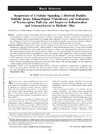Please use this identifier to cite or link to this item:
https://accedacris.ulpgc.es/jspui/handle/10553/75284
| Title: | Suppressor of Cytokine Signaling 1–Derived Peptide Inhibits Janus Kinase/Signal Transducers and Activators of Transcription Pathway and Improves Inflammation and Atherosclerosis in Diabetic Mice | Authors: | Recio Cruz, Carlota Pilar Oguiza, Ainhoa Lazaro, Iolanda Mallavia, Beñat Egido, Jesus Gomez-Guerrero, Carmen |
UNESCO Clasification: | 320502 Endocrinología | Issue Date: | 2014 | Project: | SAF2009-11794 SAF2012-38830 FIS PI10/00072 |
Journal: | Arteriosclerosis, Thrombosis, and Vascular Biology | Abstract: | Objective— Activation of Janus kinase/signal transducers and activators of transcription (STAT) pathway by hyperglycemia and dislypidemia contributes to the progression of diabetic complications, including atherosclerosis. Suppressor of cytokine signaling (SOCS) proteins negatively regulate Janus kinase/STAT and have emerged as promising target for anti-inflammatory therapies. We investigated whether a cell-permeable lipopeptide corresponding to the kinase inhibitory region of SOCS1 could reduce atherosclerosis in diabetic mice and identified the mechanisms involved. Approach and Results— Streptozotocin-induced diabetic apolipoprotein E–deficient mice (aged 8 and 22 weeks) were given intraperitoneal injections of vehicle, SOCS1-derived peptide, or control mutant peptide for 6 to 10 weeks. SOCS1 therapy suppressed STAT1/STAT3 activation in atherosclerotic plaques of diabetic mice and significantly reduced lesion size at both early and advanced stages of lesion development compared with vehicle group. Plaque characterization demonstrated that SOCS1 peptide decreased the accumulation of lipids, macrophages, and T lymphocytes, whereas increasing collagen and smooth muscle cell content. This atheroprotective effect was accompanied by systemic (reduced proinflammatory Ly6Chigh monocytes and splenic cytokine expression) and local (reduced aortic expression of chemokines and cytokines) mechanisms, without impact on metabolic parameters. In vitro, SOCS1 peptide dose dependently inhibited STAT1/STAT3 activation and target gene expression in vascular smooth muscle cells and macrophages and also suppressed cytokine-induced cell migration and adhesion processes. Conclusions— SOCS1-based targeting Janus kinase/STAT restrains key mechanisms of atherogenesis in diabetic mice, thereby preventing plaque formation and increasing plaque stability. Approaches to mimic native SOCS1 functions may have a therapeutic potential to retard the progression of diabetic complications. | URI: | https://accedacris.ulpgc.es/handle/10553/75284 | ISSN: | 1079-5642 | DOI: | 10.1161/ATVBAHA.114.304144 | Source: | Arteriosclerosis, Thrombosis, and Vascular Biology [ISSN 1079-5642], v. 34 (9), p. 1953–1960 |
| Appears in Collections: | Artículos |
WEB OF SCIENCETM
Citations
61
checked on Feb 8, 2026
Page view(s)
58
checked on Jan 10, 2026
Download(s)
79
checked on Jan 10, 2026
Google ScholarTM
Check
Altmetric
Share
Export metadata
Items in accedaCRIS are protected by copyright, with all rights reserved, unless otherwise indicated.
